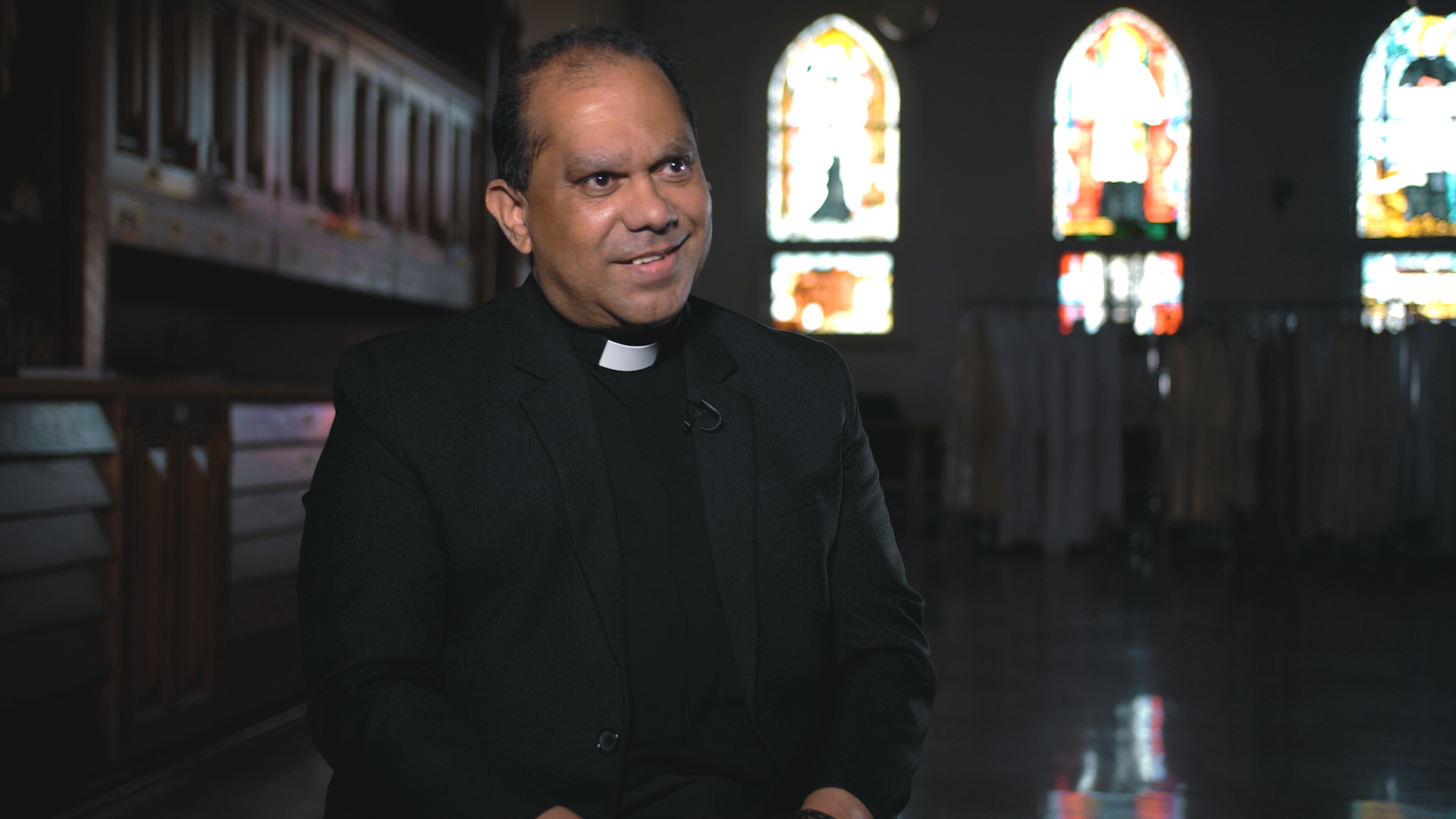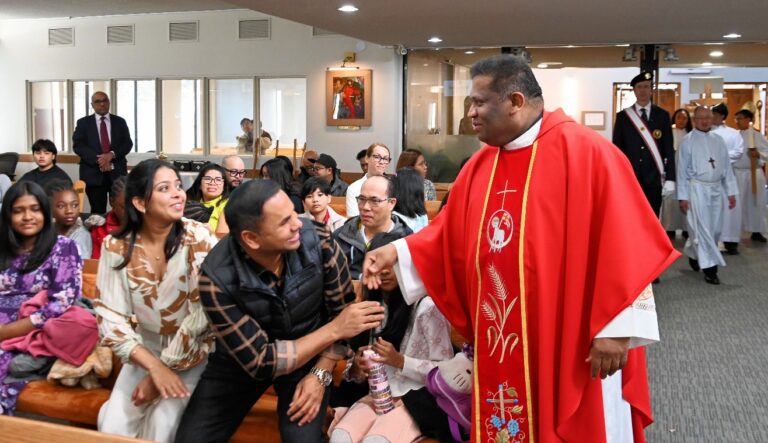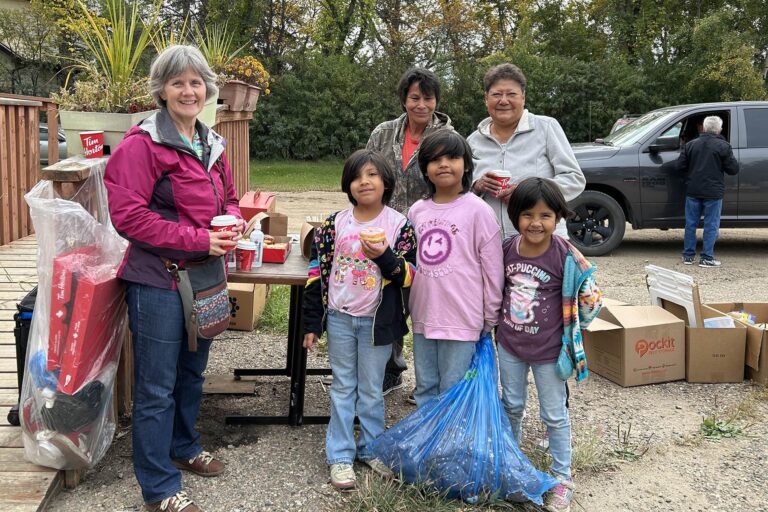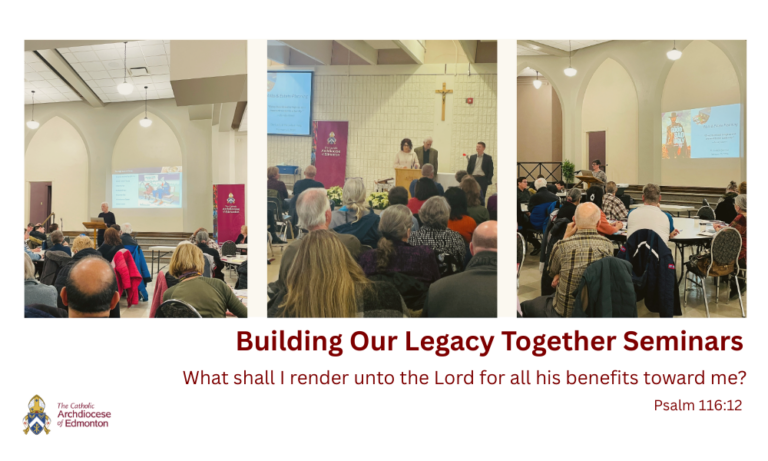Fr. Joseph Vadassery is a priest for the Archdiocese of Edmonton and the rector of St. Joseph’s Cathedral Basilica. Father Joseph grew up in India as the oldest of three children. He was ordained to the priesthood in India in 1997 and moved to Canada in 2005. Watch his episode of Be Not Afraid here.
What is your earliest memory of the priesthood?
Well, I was born and brought up in a Catholic family. Perhaps my earliest memory was during elementary school. There was a church close by, as well as a Carmelite monastery.
I often saw all these priests and seminarians and I thought, “These guys look pretty decent, you know!” They were very elegant and well dressed, because they would go around with their black cassocks.
In Kerala, where I\’m from, the priests don\’t go about in pants and shirts. We would only ever see the priests in cassocks. They are not ever in casual wear, only cassocks.
Here in Canada, it is different. Fewer priests wear their collars, when they are doing something casual like shopping. I understand. Sometimes it is comfortable to wear your clerics. Sometimes it\’s not. Sometimes it\’s embarrassing when people stare at you because you are wearing your clerics. But it\’s OK.
It is a witness. You know, we are what we are. So, I think it has both sides to it.
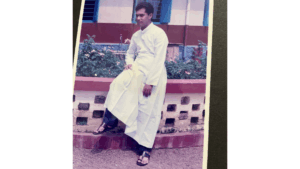
When did your interest in the priesthood become a serious intention?
In high school, that is the time when I thought of it seriously. Often, while I was in school, we would spend our evenings at the Carmelite monastery, where we would play soccer. So we were there with the priest for more than Sunday celebration; it was part of the whole village way of life.
I was about 13 or 14 when I decided that I would go, and then I entered seminary at 18.
I went up north to become a diocesan priest. I went to a province called Odisha, which is up north, closer to Calcutta, a missionary diocese. And I went and joined that diocese, because they were recruiting seminarians from the province of Kerala, where I am from.
Why not be a diocesan priest for your own province? Was it recommended that you become a missionary priest?
No, nobody recommended it. I thought, “in Kerala, we have so many priests already.” And being up north, it was an experience, away from home. I wanted to serve where priests were needed.
Did you ever discern the vocation of marriage?
No, not really. There is a big cultural difference [between Canada and India]. We have mixed schools, but in those days, boys and girls, we didn\’t mingle or go about in a casual way, like we see here because that would be a scandal!
In high school, if somebody is talking to a girl, that is the end of the world! And then you get reported to your teachers. So mostly boys only hang out with boys and vice-versa for the girls.
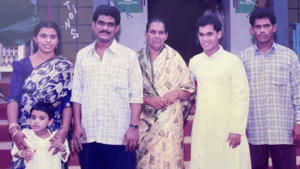
What did your parents think of you joining seminary?
Well, my dad died in 1982 when I was 14, before I joined the seminary. In those days, cancer was not as well known. But I think he had stomach cancer, and then after a couple of years, he passed away.
[It made] me stronger. I was able to take up the responsibility of helping Mom after the death of my dad. Everything falls on the oldest, and I\’m the oldest. So my mom and I did a lot together. And then after four years, I was able to see that she can manage on her own without me being right there.
I have two brothers and one sister, so there are four of us. Our mother never said no to any one of us. Whatever we wanted to choose, she always supported us. When I was 18, I told my Mom, “I think I will go to the seminary.” And all she said was, “Don’t come back.”
She meant well. Because it was a “fashion” after high school to go to the seminary for a couple of years, become disciplined and then come back and get into some other profession. Some people would use seminary for their own, personal formation, without ever becoming a priest.
So what my mother meant was: “Be serious. If you\’re choosing this, then do it.” She wanted me to mean business, not to just see seminary as a trial-and-error method.
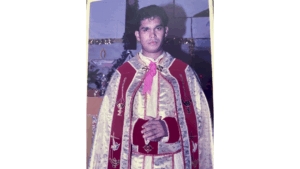
Were you nervous about the priesthood or the life of a missionary priest?
Well, when I first went [to Odisha], it was difficult to be away from my hometown and the language, the culture, because everything is different up in the north. And it was tough. But then you realize that that’s life. If you want to become a priest, this is what you must go through. So it\’s not easy, but it was not too difficult either, because we need to be disciplined. We need to have the formation. This is what we are aspiring for!
You were at seminary for 11 years. Did you ever doubt your vocation? Did you ever think about leaving?
Not really, but maybe once I casually thought about it. I was on summer vacation to a parish that I would later on serve at and I was down with malaria.
I was throwing up, you know, the whole night. Then I thought “Oh God, what is this? Is this what it is all about?” That\’s not what I had seen from the priests back home. I hadn’t seen this part of the lifestyle. Back home we would see the priests come all elegant and classic … but that\’s not what life is all about.
I was down with malaria for two weeks. The other parish priest, he was busy with his work and I was just a sick seminarian, who couldn’t do anything except throw up!
For the other people around me, getting sick with malaria like that was normal. But it wasn’t normal for me. Maybe if I get married or something, there will be at least somebody who can take care of me, at least when you\’re throwing up so much! Someone could come and pat me on the back, and at least that would ease the suffering.
Afterwards, once the malaria was over, I thought: “We are not sick every day.” So that thought of not becoming a priest was just a flash.
After you were ordained, do you remember your first time celebrating Mass?
Whoa, well, that is a great experience to celebrate the Mass. That is the great moment. Of course, I was nervous, but that is a great experience.
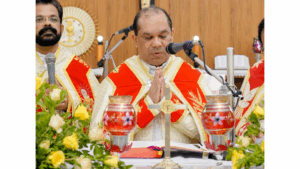
What was it like to experience your first parish?
I was assigned as an associate priest up in a big parish in the north. It was in an area that had been developed by Spanish missionaries. It was an area where the roads were not great, or sometimes there were no roads at all. The Spaniards – who originally colonized that area – would have used horses to get around, in the mountain terrain but I only had my two feet.
We had 66 mountain villages that we would need to walk to. The furthest village where we would go to celebrate Mass was almost 18 to 20 kilometres, by foot. Although, after one year, I was able to get a motorcycle!
The problem or disadvantage with those villages was that they get Holy Mass only once in three or four months. Every Sunday we would have catechists doing the Liturgy of the Word. We would train them at the main church and then send them out.
The priests visit most of those villages only once every three or four months. In a week\’s time we would cover at least 15 to 20 villages, and then we would come back to the main church. By the time you come back from that week away, we will likely be down with malaria.
In that forest and mountain terrain, we would be walking around so much, to be with the people and to celebrate the sacraments and so your routine is always changing. When you’re walking so much, you become tired and when you are weak, the malaria parasite gets in. Back home malaria is like the common cold.
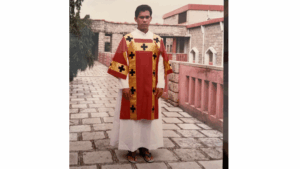
In those first couple years of being a priest, what did you enjoy the most?
You know, going to those villages, the whole village would wait for the priest to come. They are so grateful to see you. To see the faith of the people, that is a tremendous experience, because they do not get a chance to receive the sacraments very often.
Each village has a small place where they gather for church, and we would call it a “hut,” but they would call it a church.
You came to Canada in 2005. How did that all come about?
So a friend of mine, who is a priest, was also working [in Edmonton] during that time, so when he came back home for holidays he said: “You know, the Archdiocese is inviting priests.”
At the time it was Archbishop Collins – now Cardinal Collins- who was Archbishop here, so he invited us, saying we were most welcome to come. So I applied and got a visa, and then I came here.
Of course, it is a cultural change, and a new place altogether, with so much to learn. As always, I try to adapt to wherever I am. And I\’m still adapting. So it’s a big change, but I do the best I can!
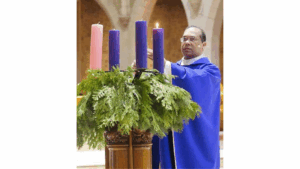
How would you compare your experience of the church in India with Canada?
So the main difference I experienced or experience even now is that here the church is the “people’s church.” Not the “priest’s church.” Back home, it is the “priest’s church.”
What I mean by that is that back home the priests have to do almost everything. We need to initiate. We need to tell people what to do. We need to push to get things done and organized. Everything depends on the priest, or what the priest wants to do.
Here, it is the people\’s church. [In a large parish like St. Joseph’s Basilica], lay people take care and be everything, and the priests are here to support them and to guide them. The priests don\’t have to tell them. Other than the sacraments, the churches here are pretty independent.
I would not say that one is good and the other is bad. Back home, it works well for the priest to be responsible for everything.
You came here as a missionary priest. Later, you were incardinated into our Archdiocese. Why did you choose incardination?
The main reason was that the diocese where I was in India has more than enough vocations.
I was already a missionary priest and I could see that they really didn’t need us. So the choice was open and I thought: “At home, they do not need more priests, but in Canada they are in need.” So I applied for incardination and Archbishop Richard Smith graciously accepted.
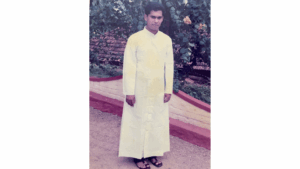
You were a missionary priest in northern India. In a sense, you\’re also a missionary priest here in Canada. Do you see a connection?
Well, it is the same, almost the same. I left my home province of Kerala in ’86 and went up north and that was all different, a different culture and a big adjustment. Then when I came here, it was also different. This experience is the same, but with a different culture.
Archbishop Smith asked how it was being here, so far from home. I told him that I can reach my hometown in Kerala sooner and faster from Canada than from my post in northern India. With flights and layovers it takes approximately 30 hours to get from Canada to Kerala. But when I was up north in India it took me almost 36 hours to get to my hometown!
When I was ordained, I chose the motto “I have come to do Your will,” which is from Hebrews 10:9. So whether I am in India or in Canada, wherever I am, the model remains the same. So, it’s not my will or my things, but it is that I have come to do the will of God. That\’s what I’m trying to do in my day to day life.
You become Rector* of St. Joseph’s Basilica in 2021. What\’s one of the biggest differences between being a priest at the Basilica and other parishes?
*Fr. Joseph exercises the function of Rector of the Cathedral, and, since a Cathedral is the proper church of the Diocesan Bishop, Fr. Joseph acts there on behalf of the Archbishop.
You know with the other parishes, most of the priests can anticipate what is coming or what is expected, right? So we have a set plan and we are programmed and we can plan well. But [here at the Basilica] it is bustling every day with a new problem.
So we will do something here at the Basilica, tend to it and we think: “Thank God, we have done this.” But then as soon as we think that something is done, then the next morning something else comes up. So every day is full of something new.
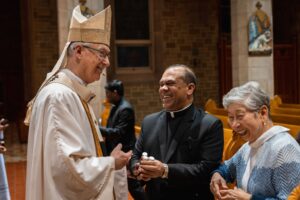
Throughout your priesthood, what has been one of your greatest joys?
Every day is a God-given gift and I am happy!
Of course, celebrating the Eucharist is the greatest, and the number of people who come faithfully to Mass, even daily Mass. This is really encouraging. Can you imagine when a priest is not available? Or for whatever reason, when people can’t go to Mass? I can’t imagine. People need God in their life.
We always have 60 to 100 people who come to the Masses at the Basilica every day. And how many hundreds come to every Sunday Mass? So we [as priests] need to be there, available, for these people who come for the sacraments.
Celebrating Mass for all these people – that is the greatest happiness.
When people say “there is no faith anymore in the world.” I say, “no, there is no proof.” There are so many people who faithfully come to Mass, who are faithfully committed to their Baptismal call.
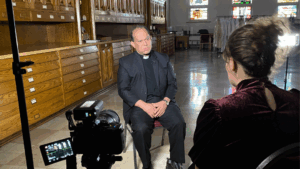
What advice would you give to a man who is discerning the priesthood?
There is nothing to be afraid of, you know. If we have the desire, then God will take care. That is true because we are not doing it. I recently went to a retreat and Cardinal Collins was the preacher. And he said again and again, “this is not our priesthood.” It is the priesthood of Jesus that we share.
So we don\’t have to be afraid, you know, because when you become a priest of Jesus, he will take care. That’s what keeps all of us priests going. We don’t have to worry about it. And of course, we try to do our best. But the Lord will take care of your life.
Watch the video version of Fr. Joseph’s story here.
To learn more about the priesthood in the Archdiocese of Edmonton, visit St. Joseph’s Seminary.
(This interview has been edited for clarity and brevity)
Jenny Connelly – Archdiocese of Edmonton
Be Not Afraid is a series of videos and companion articles that tell the stories of 12 religious sisters and priests who serve within the Archdiocese of Edmonton.
New episodes are released every Thursday. Subscribe to our YouTube channel to watch new episodes each week.

